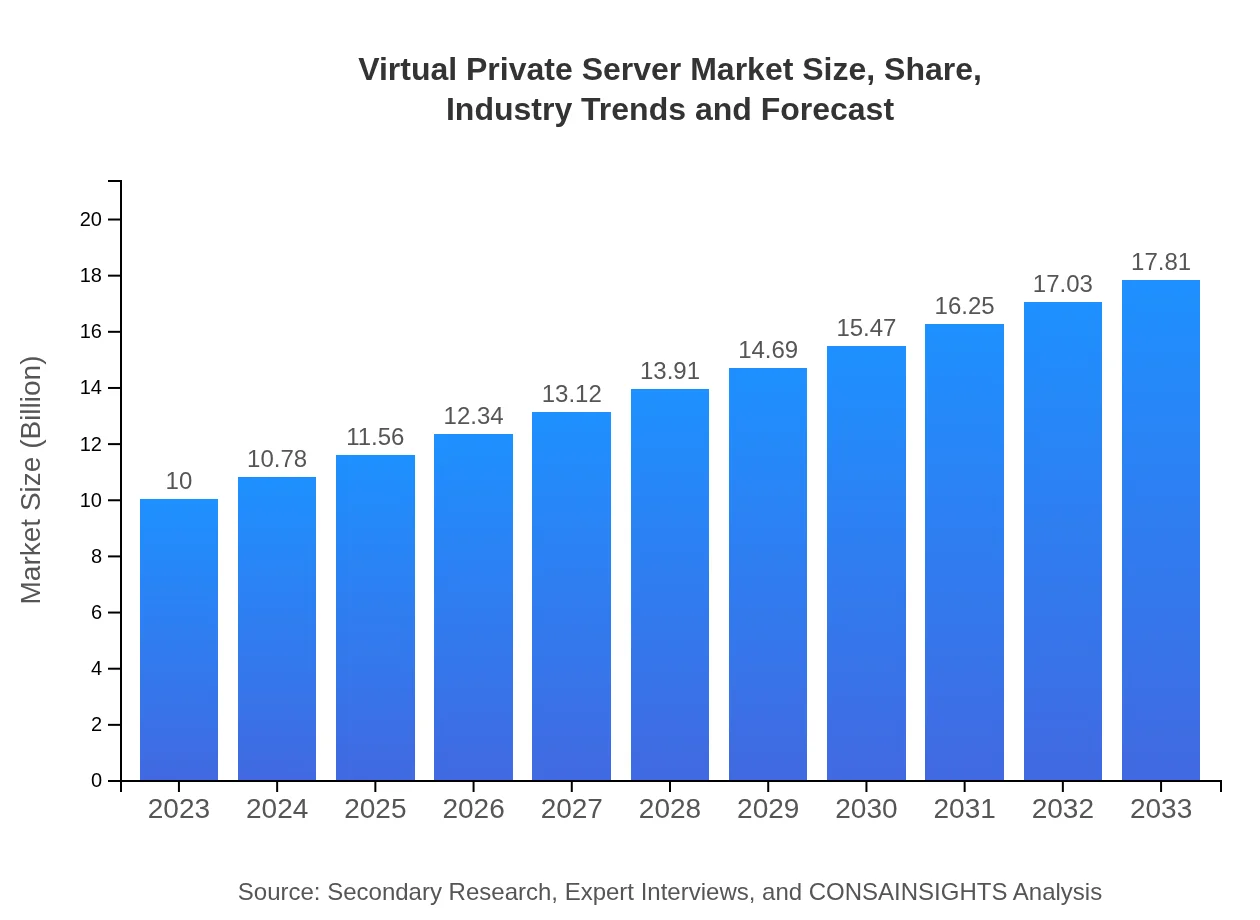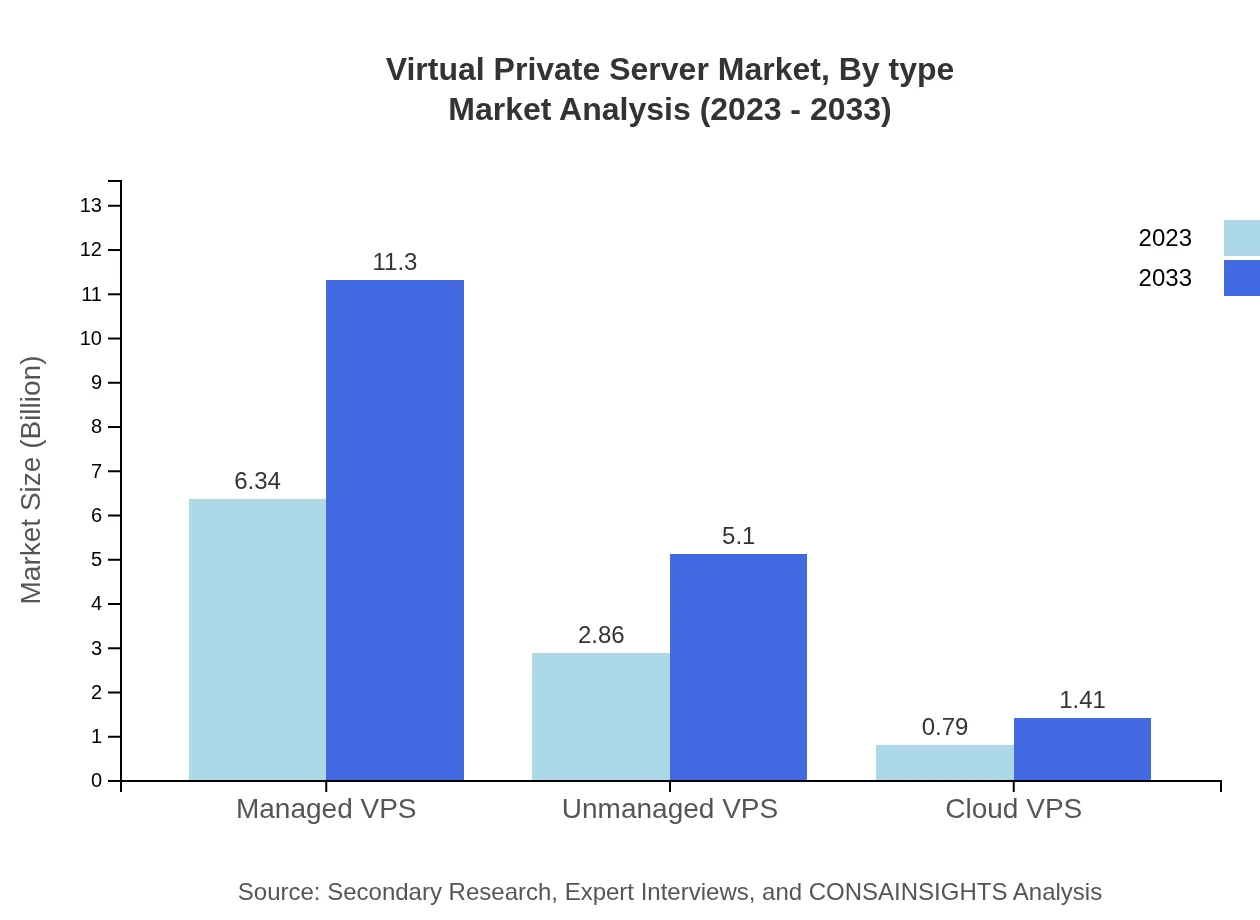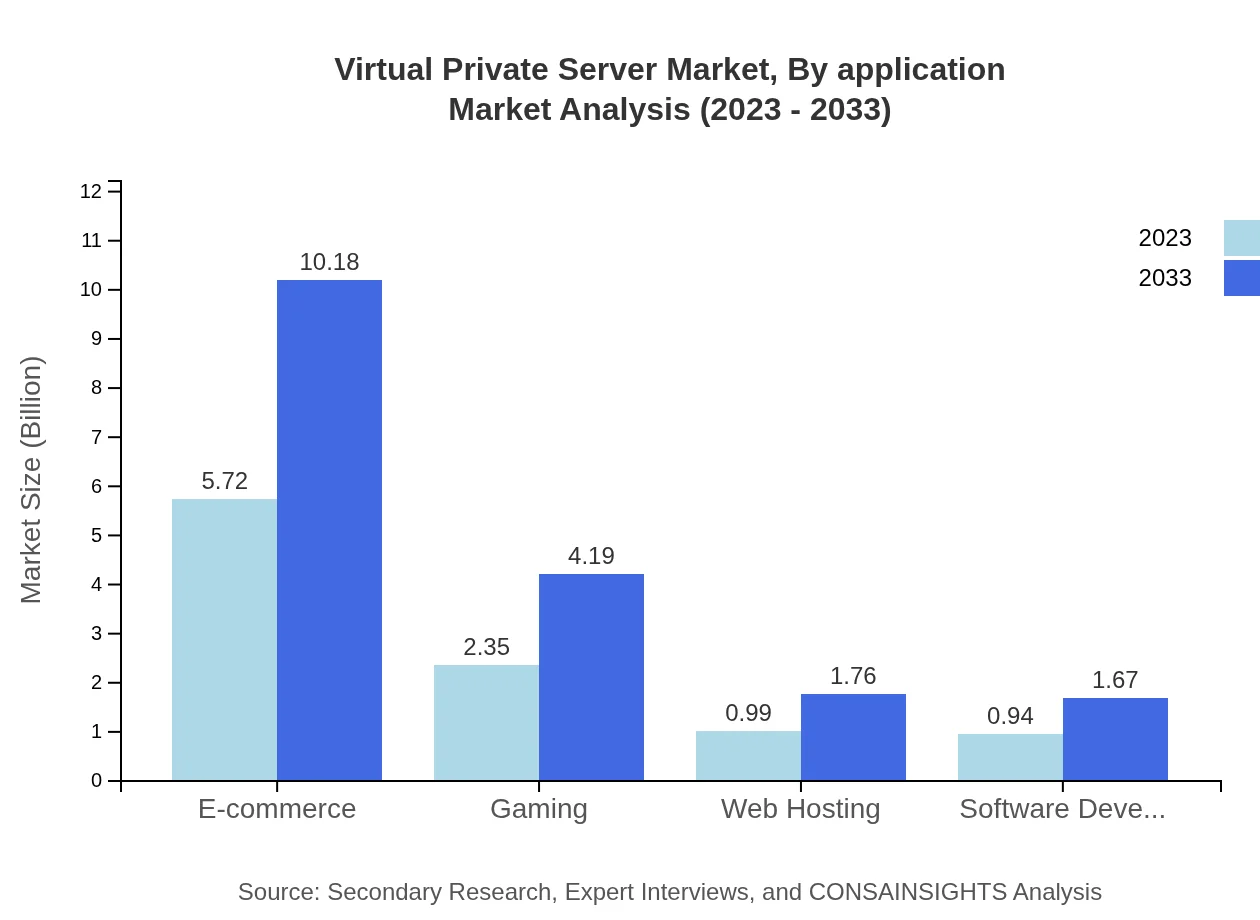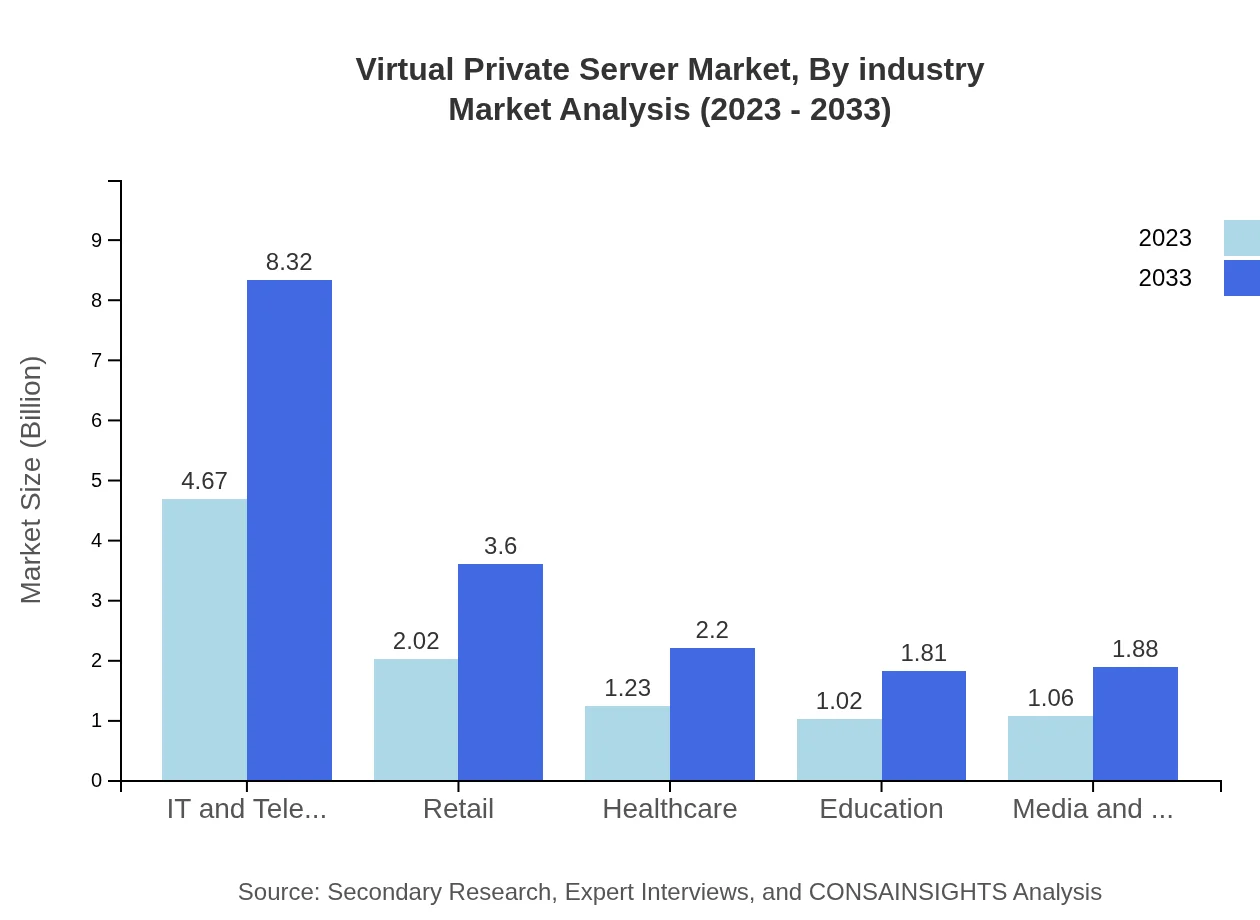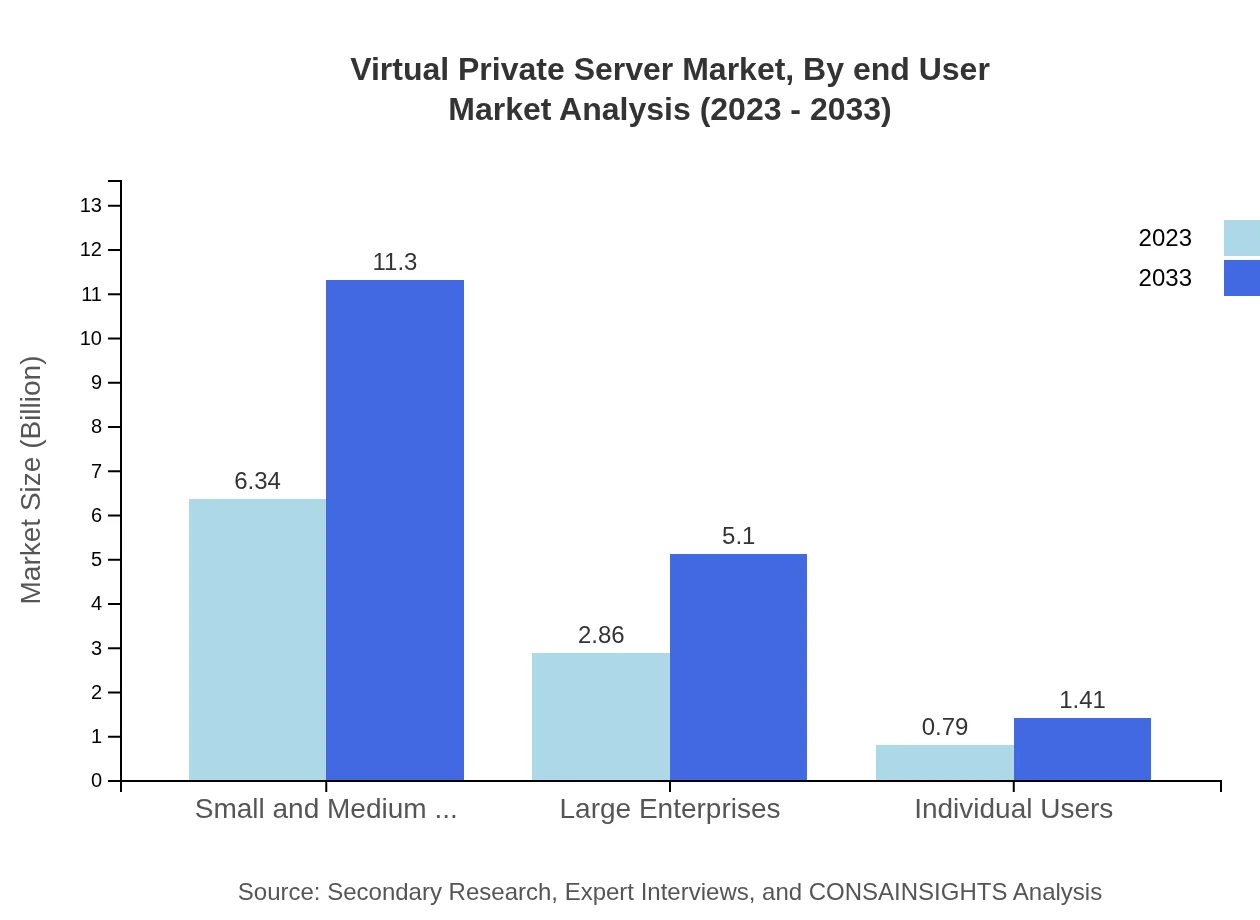Virtual Private Server Market Report
Published Date: 31 January 2026 | Report Code: virtual-private-server
Virtual Private Server Market Size, Share, Industry Trends and Forecast to 2033
This market report provides an in-depth analysis of the Virtual Private Server (VPS) landscape from 2023 to 2033, focusing on market size, segment performance, regional insights, and future forecasts. The insights aim to inform strategy and investment decisions in the VPS sector.
| Metric | Value |
|---|---|
| Study Period | 2023 - 2033 |
| 2023 Market Size | $10.00 Billion |
| CAGR (2023-2033) | 5.8% |
| 2033 Market Size | $17.81 Billion |
| Top Companies | DigitalOcean, Vultr, Linode, AWS, Google Cloud |
| Last Modified Date | 31 January 2026 |
Virtual Private Server Market Overview
Customize Virtual Private Server Market Report market research report
- ✔ Get in-depth analysis of Virtual Private Server market size, growth, and forecasts.
- ✔ Understand Virtual Private Server's regional dynamics and industry-specific trends.
- ✔ Identify potential applications, end-user demand, and growth segments in Virtual Private Server
What is the Market Size & CAGR of Virtual Private Server market in 2023?
Virtual Private Server Industry Analysis
Virtual Private Server Market Segmentation and Scope
Tell us your focus area and get a customized research report.
Virtual Private Server Market Analysis Report by Region
Europe Virtual Private Server Market Report:
The VPS market in Europe is anticipated to increase from $3.00 billion in 2023 to $5.34 billion by 2033 as companies prioritize security and flexibility in their IT environments. Factors include stringent data protection regulations and growing demand for reliable hosting services.Asia Pacific Virtual Private Server Market Report:
In the Asia Pacific region, the VPS market is set to grow from $1.86 billion in 2023 to $3.31 billion by 2033, driven by an expansion in SMEs and rising internet penetration. Increasing investments in digital infrastructure and cloud adoption are compelling more businesses towards VPS solutions.North America Virtual Private Server Market Report:
North America remains the largest market for VPS, expected to grow from $3.81 billion in 2023 to $6.78 billion in 2033. This region benefits from the presence of major cloud service providers and a high adoption rate of advanced IT solutions among businesses.South America Virtual Private Server Market Report:
South America’s VPS market is projected to advance from $0.81 billion in 2023 to $1.43 billion in 2033. This growth will be supported by the region's escalating eCommerce activities and digital transformation initiatives, allowing local businesses to leverage efficient hosting solutions.Middle East & Africa Virtual Private Server Market Report:
The Middle East and Africa market is expected to grow from $0.53 billion in 2023 to $0.94 billion by 2033, primarily assisted by government initiatives for digital transformation and increasing usage of cloud services within various sectors.Tell us your focus area and get a customized research report.
Virtual Private Server Market Analysis By Type
The VPS market is categorized into three primary types: Managed VPS, Unmanaged VPS, and Cloud VPS. Managed VPS services dominate the market, projected to scale from $6.34 billion in 2023 to $11.30 billion by 2033, holding approximately 63.42% market share in both years. Unmanaged VPS is also growing, expected to reach $5.10 billion by 2033, whereas Cloud VPS, though smaller, will grow steadily from $0.79 billion in 2023 to $1.41 billion in 2033.
Virtual Private Server Market Analysis By Application
Different end-user applications include IT and Telecom, E-commerce, Healthcare, and more. The IT and Telecom sector remains a crucial segment, with a market size of $4.67 billion in 2023, anticipated to grow to $8.32 billion by 2033. E-commerce follows closely with significant market engagement, expected to evolve from $5.72 billion in 2023 to $10.18 billion in 2033, indicating the rising digitization of retail services.
Virtual Private Server Market Analysis By Industry
The primary industries utilizing VPS include E-commerce, Gaming, Retail, and Education. Notably, the E-commerce sector is set for robust growth, reaching $10.18 billion by 2033, from $5.72 billion in 2023. The Gaming industry also shows potential, anticipated to increase from $2.35 billion to $4.19 billion within the same timeframe.
Virtual Private Server Market Analysis By End User
The end-user segmentation highlights the needs of Small and Medium Businesses (SMEs) and Large Enterprises. SMEs dominate the market, with expected revenues rising from $6.34 billion in 2023 to $11.30 billion by 2033, showing a strong preference for cost-effective and flexible hosting solutions. Large Enterprises are also expanding, projected to grow from $2.86 billion to $5.10 billion.
Virtual Private Server Market Trends and Future Forecast
Tell us your focus area and get a customized research report.
Global Market Leaders and Top Companies in Virtual Private Server Industry
DigitalOcean:
Providing scalable cloud computing environments tailored for developers, DigitalOcean emphasizes simplicity and efficiency, with a substantial presence in the VPS market.Vultr:
Vultr specializes in high-performance cloud VPS solutions with a global reach, focusing on providing affordable and user-friendly hosting services.Linode:
Linode offers cloud hosting and virtual servers that cater to developers and enterprises, emphasizing strong customer support and performance.AWS:
Amazon Web Services provides a comprehensive suite of cloud solutions, including VPS offerings, appealing to larger enterprises with robust infrastructure and services.Google Cloud:
Google Cloud provides versatile VPS solutions alongside its rich cloud functionalities, focusing on security, scalability, and integration.We're grateful to work with incredible clients.









FAQs
What is the market size of virtual Private Server?
The global Virtual Private Server market is currently valued at approximately $10 billion, with a projected CAGR of 5.8% over the next decade, indicating robust growth potential in this industry.
What are the key market players or companies in this virtual Private Server industry?
Key players in the Virtual Private Server industry include prominent companies such as DigitalOcean, Linode, InMotion Hosting, Vultr, and A2 Hosting, each offering innovative VPS solutions tailored to diverse customer needs.
What are the primary factors driving the growth in the virtual Private Server industry?
The growth of the VPS market is primarily driven by increasing demand for reliable and scalable hosting solutions, the rise of cloud computing, and the need for improved data security and privacy among businesses worldwide.
Which region is the fastest Growing in the virtual Private Server?
The fastest-growing regions for the Virtual Private Server market are North America and Europe, with North America projected to grow from $3.81 billion in 2023 to $6.78 billion by 2033, reflecting significant demand.
Does ConsaInsights provide customized market report data for the virtual Private Server industry?
Yes, ConsaInsights offers customized market reports tailored to specific needs within the Virtual Private Server industry, providing detailed insights and data analysis for informed decision-making.
What deliverables can I expect from this virtual Private Server market research project?
Deliverables from the Virtual Private Server market research project include comprehensive reports, market forecasts, competitive analysis, segmentation data, and actionable recommendations specifically tailored to client requirements.
What are the market trends of virtual Private Server?
Market trends for Virtual Private Servers include a shift towards managed VPS solutions, increased adoption by small to medium businesses, and growing demand for enhanced performance and security features in hosting services.

